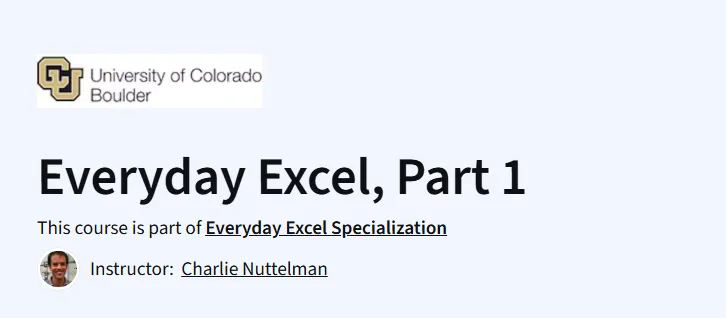Everyday Excel, Part 1
An engaging, hands-on Excel course that teaches core skills—formulas, data handling, and charts—in just two weeks, making Excel approachable and practical for beginners.
What will you learn in Everyday Excel, Part 1 Course
Navigate Excel—open files, move between sheets, edit cells, and apply formatting.
Use formulas and built-in functions: logical, text, financial, and more.
Manage data: sort, filter, remove duplicates, consolidate, validate entries, and use lookups like VLOOKUP or INDEX/MATCH.
Visualize data with charts—scatter, column, pie charts—and dynamic elements like Slicers, Sparklines, and PivotTables.
Program Overview
Module 1: Navigating Excel
Duration: ~5 hours
Topics: Learn worksheet navigation, editing, formatting, cell referencing, relative vs absolute addressing, naming ranges, and basic VBA macro recording.
Hands-on: Quiz + in-Excel assignment for navigation, formatting, macros.
Module 2: Expression Entry & Common Functions
Duration: ~4 hours
Topics: Understand Excel syntax, order of operations, mathematical formulas, and basic functions like SUM, COUNT, AVERAGE, rounding, random, combinations/permutations.
Hands-on: Quiz + Excel assignment to master these functions.
Module 3: More Excel Functions
Duration: ~4 hours
Topics: Learn logical functions (IF, AND, OR, SUMIF, COUNTIF, AVERAGEIF), text functions, financial functions, array formulas, dynamic named ranges, and user-defined VBA functions.
Hands-on: Quiz + Excel assignment applying these advanced functions.
Module 4: Managing Data
Duration: ~4 hours
Topics: Apply filters, create tables, validate data, remove duplicates, consolidate data, and use lookup functions like VLOOKUP, INDEX/MATCH.
Hands-on: Quiz + in-Excel assignment for data cleaning and lookups.
Module 5: Plotting, Importing & File Export
Duration: ~4 hours
Topics: Create scatter plots, column/pie charts, slicers, sparklines, PivotTables; share data to Word/PowerPoint; export/print as PDF.
Hands-on: Quiz + Excel assignment to create visualizations and export results.
Get certificate
Job Outlook
Kickstarts skills valuable for roles such as Business Analyst, Operations Analyst, Data Entry Specialist, and Financial Analyst
Competence in Excel streamlines tasks like budgeting, reporting, and analysis across industries.
Often serves as a foundational step toward advanced data and analytics roles—from ₹5–10 LPA in India to $50,000–$90,000 USD globally.
- Beginner-centric and intuitive, building from basics to actionable Excel tasks.
- Interactive, in-app Excel assignments provide real-world practice and retention.
- Part of a broader specialization—makes progressing to advanced Excel seamless.
- Focused on foundational skills; more advanced or domain-specific Excel use cases come in later series parts.
- Based on desktop Excel; mobile support is limited.
Specification: Everyday Excel, Part 1
|
FAQs
- Learn shortcuts and tips to navigate large spreadsheets quickly.
- Understand formulas to automate repetitive calculations.
- Practice creating templates for recurring tasks.
- Gain confidence in formatting and organizing data efficiently.
- Apply practical techniques to real-world work scenarios.
- Learn basic functions for summarizing and interpreting data.
- Understand how to use charts and PivotTables for insights.
- Explore conditional formatting for quick visual analysis.
- Use filtering and sorting to examine datasets.
- Build foundational skills for future analytics learning.
- Export Excel sheets to Word, PowerPoint, and PDF formats.
- Learn to import data from external sources.
- Understand basic CSV and text file handling.
- Gain tips for sharing Excel reports with colleagues.
- Prepare for workflow integration in professional settings.
- Learn to sort and filter large datasets.
- Use tables and structured references for organization.
- Identify and remove duplicates easily.
- Apply logical formulas for data validation.
- Develop skills to manage data without confusion or errors.
- Create charts and visual summaries for clear communication.
- Use conditional formatting to emphasize key data points.
- Learn best practices for layout and readability.
- Combine charts, tables, and text for professional reports.
- Prepare visual data outputs suitable for meetings or presentations.





